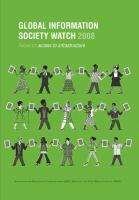APC is a network as well as an organisation with a programme structure. APC’s strongest activities are often those taking place at the local or national level, where the real impact can be seen, yet learning from and implemented worldwide. We work best when programme and member staff work together to conceptualise projects and campaigns and then implement them together.
The strategic plan proposes a number of APC-wide initiatives, some of which have already started, and we expect that new ones will emerge. Here are a selection:
Global Information Society Watch 
This annual watchdog report1 which started in 2007 looks at a different area of internet development and freedoms each year and reports on the state of the information society across the globe. By 2012, we aim to have country reports from 100 nations. The theme for 2009 is access to knowledge and information.
APC’s action research network
The APC network of activists, researchers and activist researchers will focus on the information commons, ICTs and climate change/sustainability, and mobile phones and the internet. APC’s research is always aimed at informing on-the-ground advocacy, so for example we may link our mobile and internet research to a campaign to open up standards in the mobile telephone industry to make it easier to produce content and applications for mobile phones and bring down the costs of mobile connectivity.
The Rapid Response Network
To fight online censorship, APC is re-forming and growing a network of people and computers first established in 2000 to help human rights, environmental and other activist groups publish and preserve content online in repressive contexts, and to resist censorship and cyber-vandalism and attacks. Experiences will be catalogued to raise awareness about the importance of freedom of expression and working securely online. We will also inject the learning into national, regional and international policy arenas.
Take Back The Tech! ![]()
This global campaign on ICTs and violence against women is part of a broader campaign around using technology most effectively to meet the Millennium Development Goals that focus on gender equality.
Campaigns are already taking place in countries as diverse as Cambodia and Brazil and we expect dozens more countries to join the campaign to stop violence against women perpetrated online or using technology (for example, the harassment of women cell phone owners in Pakistan), and to use technology to promote women’s equality instead.